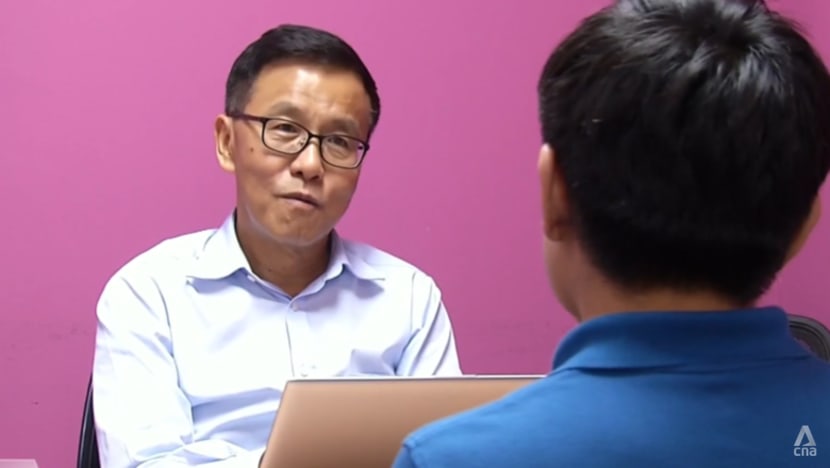With lure of quick money and illegal betting sites, problem gamblers are getting younger: Councillors
Organisations are seeing gambling addicts as young as in their 20s to 30s.

A counsellor speaks to a gambling addict. Organisations say those seeking help with gambling addiction are getting increasingly younger.

This audio is generated by an AI tool.
SINGAPORE: Peter (not his real name) made his first bet in football when he was just 11 years old – with his aunt’s help.
He won, kickstarting a gambling habit that grew into an addiction.
Speaking on the condition of anonymity, the 32-year-old told CNA he grew up with a culture of gambling. His father remains an addict today.
“It (gambling) was, in a way, normalised in my family. So for me, it didn't feel like I was stepping into the darkness,” said Peter.
At first, he fuelled his addiction with his allowance and income from part-time work. Then, he started borrowing money from family and friends.
“If I owe two people money (and) I borrow from a third person, I'm supposed to take that money to pay these two people off. But I take that money and gamble more with the hope of making back (money) to pay all three,” he said.
He added he kept thinking that if he stopped gambling and depended on a full-time salary to return the money he owed, he would never be able to. Today, he calls this “flawed thinking”.
Eventually, Peter stole from the company he worked for, and ran away to Malaysia.
But with encouragement from his girlfriend and his mother, he returned to Singapore and sought help for his addiction.
Since then, Peter has stayed off gambling for two years, and has learnt to avoid the triggers. For the football fan, this means not watching live games anymore.
"Now, I just watch highlights, and you can't bet on highlights right, because the game has ended,” he said.
Peter estimated he lost about S$150,000 to over 10 years of gambling activities.
PROBLEM GAMBLERS GETTING YOUNGER
Counsellors CNA spoke to said that like Peter, those seeking help with a gambling addiction are getting increasingly younger.
They said these tech-savvy addicts are finding it easier to access illegal online gambling sites, and are lured by the promise of quick and easy money.
They mainly bet on sports like football and basketball, and play casino games on illegal gambling websites.
Singapore Pools is the only gambling service provider licensed to offer legal online gambling services in Singapore.
At Arise2Care, which specialises in helping problem gamblers, those the organisation helps can be as young as in their 20s to 30s, said its chairwoman Jolene Ong. They are also starting their gambling activities earlier, she said.
“One of the contributing factors is peer influence. The other one is that all these online platforms give them the convenience to gamble,” she said.
Illegal online gambling sites provide credits so that users do not need to come up with upfront cash, she noted.
Ms Yvonne Yuen from addiction recovery centre WE CARE Community Services – which is also increasingly seeing younger problem gamblers – said that the anonymity the platforms provide is appealing to addicts.
“That gives them even more freedom, or perceived freedom that they could indulge in it (gambling),” she said.
Both counsellors also pointed to easy access via smartphones. Temptations also come in the form of unsolicited text messages offering illegal gambling services, as well as advertisements on gaming and video streaming sites.
This is even as the Gambling Regulatory Authority has blocked more than 3,400 illegal gambling websites
NEED FOR PUBLIC EDUCATION, FAMILY INVOLVEMENT
With problem gamblers getting younger, Ms Yuen called for public education efforts to continue and for schools to play a bigger role in raising awareness about the issue.
People should learn from young that “there's no such thing as free lunches”, she said.
“They always think of getting free money, quick money, quick bucks, and that's where the attraction lies.”
Families should also learn to spot the problem early and intervene in the right way, said Ms Ong.
By the time young problem gamblers tell their families of their addiction, they would have typically racked up several debts, she said.
In most instances, the families would jump in to settle the debts, she added. However, given that the addiction has not been resolved, the debts would start to build up again.
"The family members need to be equipped so that they can intervene effectively and sooner, before hell breaks loose,” said Ms Ong.
She said in her organisation’s support group for young addicts, parents are also involved.
In one addict’s case, his parents took away his smartphone and laptop so that he would not be able to gamble online when he is alone in his room, when he would be most tempted.
The counsellors added that making counselling more accessible will also help to better address the issue of problem gambling.
For Paul (not his real name), who started gambling online at the age of 18, an injury escalated his habit.
"I fractured my wrist. I didn't have the money to seek medical treatment. So that time when I actually first won in online gambling, about S$100 to S$200, I really felt like it was a gift to me. So I started to get addicted."
Paul racked up huge debts by taking out cash advances on his credit cards, and also borrowed from family and friends to feed his addiction.
Paul eventually took his brother's advice and sought counselling at Arise2Care, where he got help with a debt repayment plan. He has since recovered from his addiction.
“If I can really go back in time, I won't even want to touch gambling, and just lead a normal, decent life,” he said.
“At least during the night time, I can sleep peacefully, I don't have to worry about the debts, and about who will come and harass (me).”



















